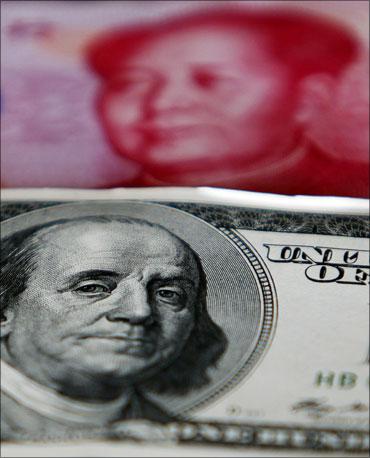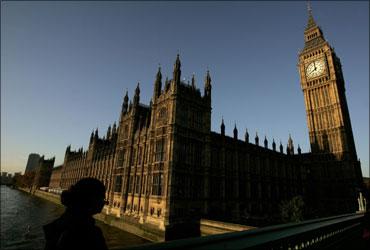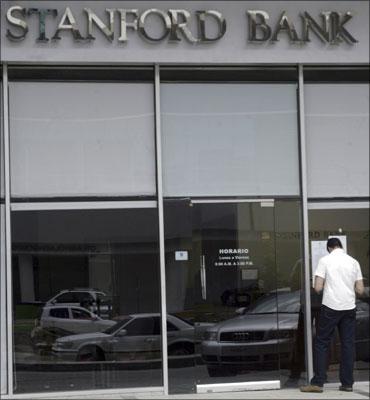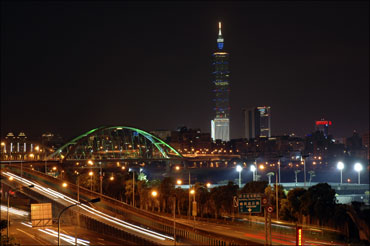
China sits on a mountain of United States treasury debt, reinforcing its position as the world's number one holder of US treasury securities with a total of $895.2 billion.
China's foreign exchange reserves too stood at a mammoth $2.45 trillion at the end of March 2010.
The US Treasury Department recently reported that China's holdings of US Treasury securities rose to $895.2 billion in March 2010.
China bought $17.7 billion worth of US treasury securities reinstating some confidence in the US dollar, after having sold $45 billion worth of US T-securities that analysts believed was a political signal to the US amid fears triggered by the weakening dollar.
Analysts attributed China's decision to revert to dollar holdings to an increase China's forex reserves and European financial woes triggered by the Greek sovereign debt crisis.
So what is US treasury debt and what's the big deal about it? Click NEXT to find out. . .

The US treasury bills, treasury notes, and treasury bonds are types of default-free securities and are considered to be the safest securities in the world. Also called T-bills, T-notes or T-bonds, these are a issued by the Treasury of the United States government.
However, even though these securities are default-free, they are not risk-free as they are also exposed to global economic changes and shifts and could lose value over time due to unfavourable conditions.
America is considered to be the world's most reliable borrower, as the US government has never defaulted on a loan. For the US to default on a loan will require global financial devastation much bigger than the one the world recently witnessed.
The US sells securities -- or borrows money -- to finance its trade deficits and fund its other financial needs.
One can thus just buy US debt and not worry about America not paying you back. However, since these securities are so safe, they have lower yields and interest rates.
Interest earned on these US securities is exempt from local taxes but not from income tax.
Treasury securities cannot be redeemed before maturity and do not have call provisions.
T-bills have maturities of one year or less; T-notes have maturities of 2-10 years; T-bonds have maturities greater than 10 years. These securities are issued in face values of $1,000.
US citizens too can buy US Treasury securities through a broker or directly from the US government through auctions.
So what is the big deal about China holding extremely high level of US treasury securities? . . .

Analysts the world over believe that China could use its huge holdings of US treasury securities as a political tool against America. Some say that if China sells huge quantities of these US securities, it could lead to the collapse or depreciaation of the US dollar.
If China were to offload its huge holdings of US assets, it could also lead to a rise in US interest rates, which in turn would lead to a decrease in investment spending. It would also lead to a drop in overseas demand for US assets.
If the dollar were to depreciate, US's trade deficit will decline: in other words, the cost of American exports will drop and the price of imports would rise in the US. But the US dollar would be affected only if a gigantic amount of US T-securities were to be sold off in a short period of time.
The 'collapse' of the dollar would also lead to high inflation and a drop in the standard of living in America.
However, the likelihood of China suddenly selling off its US securities is very low as the move would also affect China's own economic interests. A big reduction in its holdings would lead to a drop in the value of the US securities and thus huge losses for China. It would also lead to a drop in US demand for imports -- and China is a huge exporter to the US, so it would not be in China's interests to reduce it holdings in a big way.
So what quantity of US securities does India hold? And, apart from China, who are the world's other big holders of US securities? . . .

India - $32 billion
India's industrial growth numbers suggest that the economy has come out of the distressed state; however economists argue that 2009 could be a tough year for India, after witnessing a speedy growth over the past several years.
India holds $32 billion worth of US securities. India has forex reserves of $273 billion.
With inflation posing a serious threat and global financial uncertainty still hovering, achieving growth targets could be a challenge. The Indian economy is currently the 12th largest in the world. That is, India's gross domestic product stands at $1.217 trillion.
However, in terms of purchasing power parity, India is the world's fourth largest economy. Its GDP in purchasing power parity terms is at $3.388 trillion.
India is the one of the world's fastest growing economies, yet its annual per capita income remains low at $1,070. That puts the country in the 163rd spot.

Japan -- $784.9 billion
Japan has the second largest stash of US debt. It holds $784.9 billion worth of US securities.
It is home to some of the leading and most technologically advanced producers of motor vehicles, electronic equipment, machine tools, steel and nonferrous metals, ships, chemicals, textiles and processed foods.
Japan's main export markets are the US, European Union, China, South Korea, Taiwan and Hong Kong. Japan's main exports are transportation equipment, motor vehicles, electronics, electrical machinery and chemicals.

United Kingdom -- $279 billion
The British economy expanded just 0.2 per cent in the first three months of 2010, lower than the growth rate in the last quarter, indicating the recovery is on a shaky ground.
However, it holds $279 billion worth of US securities.
The sluggish growth in the January-March period, which has come less than two weeks before the general polls, indicates that the UK economy continues to struggle. "Gross Domestic Product increased 0.2 per cent in the first quarter of 2010, compared with an increase of 0.4 per cent in the previous quarter.
The decrease in the growth rate was due to weaker growth in services," the Office for National Statistics said in a statement on Friday. The UK economy witnessed a growth of 0.4 per cent in the 2009 December quarter, after being battered by the financial meltdown.
This marked the country coming out of recession, following six straight quarters of contraction. According to the statement, the total services output rose 0.2 per cent in the March quarter as compared to 0.5 per cent in the last three months of 2009.
The US Department of Treasury includes Channel Islands and Isle of Man in the United Kingdom.

Oil Exporters -- $229.5 billion
The Organization of the Petroleum Exporting Countries is a permanent, intergovernmental organisation, created at the Baghdad Conference in 1960, by Iran, Iraq, Kuwait, Saudi Arabia and Venezuela. During the first five years of its existence OPEC had its headquarters in Geneva, Switzerland. Later this was moved to Vienna, Austria, on September 1, 1965. The OPEC Conference of Ministers meets in ordinary session twice a year, and is responsible for the formulation of the general policy of the organisation.
Oil exporters, as defined by the US Department of the Treasury, include Ecuador, Venezuela, Indonesia, Bahrain, Iran, Iraq, Kuwait, Oman, Qatar, Saudi Arabia, the United Arab Emirates, Algeria, Gabon, Libya, and Nigeria.

Brazil -- $164.4 billion
The Federative Republic of Brazil is a country in South America. It is the fifth largest country by geographical area, occupying nearly half of South America.
Brazil is the largest national economy in Latin America, the world's 10th largest economy at market exchange rates and the ninth largest in purchasing power parity, according to the International Monetary Fund and the World Bank.
The country has been expanding its presence in international financial and commodities markets, and is regarded as one of the group of four emerging economies called BRIC (Brazil, Russia, Indian and China).
The country is known for its booming agricultural, mining, manufacturing and service sectors, as well as a large labour pool.
Brazilian exports are currently scaling new heights, its major export products being aircraft, coffee, automobiles, soybean, iron ore, orange juice, steel, ethanol, textiles, footwear, corned beef and electrical equipment.

Hong Kong -- $150.9 billion
Hong Kong, a self-governing territory of the People's Republic of China, is a global metropolitan and international financial centre, and has a highly developed capitalist economy.
Its highly capitalist economy has been ranked the freest in the world by the Index of Economic Freedom for 15 consecutive years.
Hong Kong is one of the world's leading financial centres and is one of the Four Asian Tigers. The Hong Kong Stock Exchange is the sixth largest in the world.
Hong Kong's economy was affected by the Asian financial crisis of 1997. The dangerous H5N1 avian influenza also surfaced that year.
After a slow recovery, Hong Kong suffered a setback again because of an outbreak of SARS in 2003.
However, today, Hong Kong continues to serve as an important global financial centre. The Hong Kong dollar has been pegged to the US dollar since 1983.

Caribbean banking centres -- $148.3 billion
Banking centres in the Caribbean also hold a significant amount of US treasury debt.
Caribbean Banking Centers as defined by the US Department of the Treasury include Bahamas, Bermuda, Cayman Islands, Netherlands Antilles and Panama and British Virgin Islands.

Taiwan -- $124.8 billion
Taiwan's rapid economic growth post World War II has transformed it into an advanced economy. Taiwan's growth is fondly referred to as the 'Taiwan Miracle'.
International Monetary Fund recognises Taiwan as an advanced economy while World Bank terms it high-income economy. Its technology industry has a major role to play in the global economy.
Taiwanese companies manufacture a large proportion of the world's consumer electronics.
Taiwan is one of the constituent of Four Asian Tigers alongside Singapore, South Korea and Hong Kong.
Today Taiwan has a dynamic capitalist, export-driven economy with gradually decreasing state involvement in investment and foreign trade.

Russia -- $120.1 billion
Russia has the world's largest reserves of mineral and energy resources, and is considered an energy superpower. It has the world's largest forest reserves, too.
It is the world's leading natural gas exporter and the second leading oil exporter.
The economic crisis that struck all post-Soviet countries in the 1990s was almost twice as intense as the Great Depression that hit Western Europe and the US in the 1930s. Russia's GDP was half of what it had been in the early 1990s, even before the financial crisis of 1998 had set in.
However, since the turn of the century, rising oil prices, increased foreign investment, higher domestic consumption and greater political stability have bolstered economic growth in Russia.

Luxembourg -- $84.6 billion
The economy of Luxembourg is largely dependent on the banking, steel, and industrial sectors. Luxembourgers enjoy the second highest per capita gross domestic product in the world (by 2007 estimates), behind Qatar. Luxembourg is the world's 6th best place to live in.
Luxembourg offers a favourable climate to foreign investment. Successive governments have effectively attracted new investment in medium, light, and high-tech industry.
US firms are among the most prominent foreign investors, producing tires (Goodyear), chemicals (DuPont), glass (Guardian Industries), and a wide range of industrial equipment.
The current value of US direct investment is almost $1.5 billion, the highest level (of US direct investment) on a per capita basis outside of North America. Japan -- $1.019 trillion